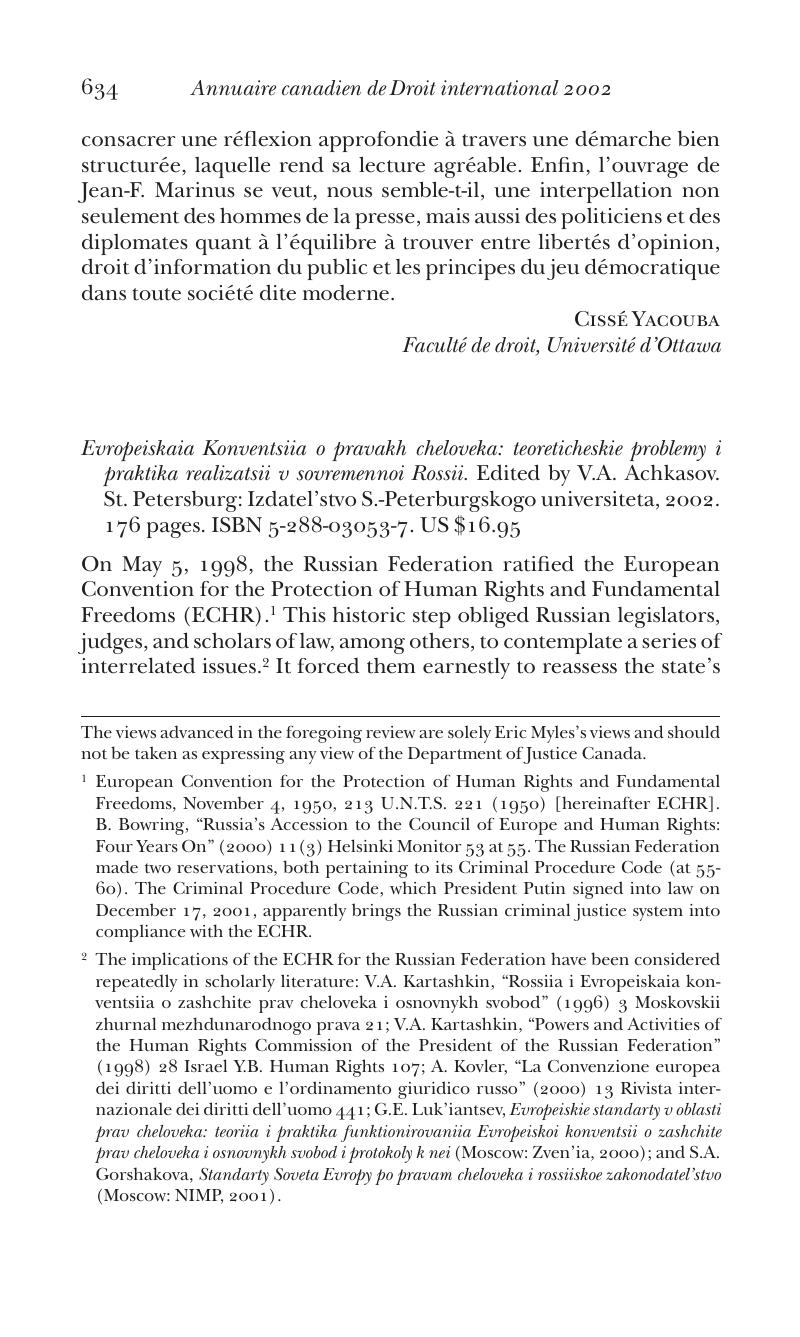No CrossRef data available.
Article contents
Evropeiskaia Konventsiia o pravakh cheloveka: teoreticheskie problemy i praktika realizatsii v sovremennoi Rossii. Edited by V. A. Achkasov. St. Petersburg: Izdatel’stvo S.-Peterburgskogo universiteta, 2002. 176 pages. ISBN 5-288-03053-7. US $16.95
Published online by Cambridge University Press: 09 March 2016
Abstract

- Type
- Book Reviews / Recensions de livres
- Information
- Canadian Yearbook of International Law/Annuaire canadien de droit international , Volume 40 , 2003 , pp. 634 - 638
- Copyright
- Copyright © The Canadian Council on International Law / Conseil Canadien de Droit International, representing the Board of Editors, Canadian Yearbook of International Law / Comité de Rédaction, Annuaire Canadien de Droit International 2002
References
The views advanced in the foregoing review are solely Eric Myles’s views and should not be taken as expressing any view of the Department of Justice Canada.
1 European Convention for the Protection of Human Rights and Fundamental Freedoms, November 4, 1950, 213 U.N.T.S. 221 (1950) [hereinafter ECHR]. Bowring, B., “Russia’s Accession to the Council of Europe and Human Rights: Four Years On” (2000) 11 (3) Helsinki Monitor 53 at 55.CrossRefGoogle Scholar The Russian Federation made two reservations, both pertaining to its Criminal Procedure Code (at 5560). The Criminal Procedure Code, which President Putin signed into law on December 17, 2001, apparently brings the Russian criminal justice system into compliance with the ECHR.
2 The implications of the ECHR for the Russian Federation have been considered repeatedly in scholarly literature: Kartashkin, V. A., “Rossiia i Evropeiskaia kon-ventsiia o zashchite prav cheloveka i osnovnykh svobod” (1996) 3 Moskovskii zhurnal mezhdunarodnogo prava 21 Google Scholar; Kartashkin, V. A., “Powers and Activities of the Human Rights Commission of the President of the Russian Federation” (1998) 28 Israel Y.B. Human Rights 107 Google Scholar; Kovler, A., “La Convenzione europea dei diritti dell’uomo e l’ordinamento giuridico russo” (2000) 13 Rivista internazionale dei diritti dell’uomo 441 Google Scholar; Luk’iantsev, G. E., Evropeiskie standarty v oblasti prav cheloveka: teoriia i praktika funktionirovaniia Evropeiskoi konventsii o zashchite prav cheloveka i osnovnykh svobod iprotokoly k nei (Moscow: Zven’ia, 2000)Google Scholar; and Gorshakova, S. A., Standarty SovetaEvropy po pravam cheloveka i rossiiskoe zakonodatel’stvo (Moscow: NIMP, 2001).Google Scholar
3 In evoking this issue, it raised additionally the long-standing issue of the extent to which Russia should emulate the institutions in western European states. The Slavophiles and the Westernizers debated this issue passionately in the nineteenth century: Walicki, A., The Slavophile Controversy: History of a Conservative Utopia in Nineteenth-Century Russian Thought (Oxford: Clarendon Press, 1973), passim.Google Scholar
4 Achkasov, V. A., ed., Evropeiskaia Konventsiia o pravakh cheloveka»: teoreticheskie prob-lemy i praktika realizatsii v sovremennoi Rossii (St. Petersburg: Izdatel’stvo S.-Peter-burgskogo universiteta, 2002).Google Scholar
5 Mutagirov, D. Z., “Sostoianie prav i svobod cheloveka v Rossii,” in Achkasov, , supra note 4 at 35 Google Scholar; Volkova, A. V., “Traditsii i prava cheloveka: problemy realizatsii Evropeiskoi Konventsii v rossiiskom zakonodatel’stve,” in Achkasov, , supra note 4 at 54 Google Scholar; Baryshnikov, D. N., “Evropeiskaia Konventsiia o pravakh cheloveka o svobode SMI i praktika Evropeiskogo Suda,” in Achkasov, , supra note 4 at 144.Google Scholar Amnesty International has recently concurred in these remarks. “Amnesty Decries State of Russian Justice,” [Toronto] Globe and Mail (October 30, 2002) A13.
6 Compare with Ferschtman, M., “Reopening of Judicial Procedures in Russia: The Way to Implement the Future Decisions of ECHR Supervisory Organs?” in Barkhuysen, T., van Emmerik, M. L., and van Kempen, P. H.P.H.M. C., eds., The Execution of Strasbourg and Geneva Human Rights Decisions in the National Legal Order (The Hague: Martinus Nijhoff, 1999), 123.Google Scholar
7 Lantsov, S. A., “Prava cheloveka v mezhdunarodnykh otnosheniiakh (teoretich-eskie kontseptsii i sovremennaia praktika)” in Achkasov, , supra note 4 at 121.Google Scholar
8 Achkasov, V. A. and Eremeev, S. G., “Printsip samoopredeleniia i zashchita prav natsional’nykh men’shinstv: teoreticheskie i prakticheskie problemy,” in Achkasov, , supra note 4 at 12.Google Scholar
9 Gutorov, V. A. and Davydov, L. V., “Svoboda informatsii v postkommunisticheskoi Rossii-mif ili real’nost’?,” in Achkasov, , supra note 4 at 58.Google Scholar
10 Mogil’naia, M. A., “Osnovy politiko-pravovogo regulirovaniia uchastiia inostrant-sev v deiatel’nosti organov mestnogo samoupravleniia v Rossiiskoi Federatsii,” in Achkasov, , supra note 4.Google Scholar
11 Liverovskii, A. A., “Osushchestvlenie sudebnogo kontrolia za sobliudeniem protsedury priniatiia i opublikovaniia normativnykh pravovykh aktov (praktika Sankt-Peterburga),” in Achkasov, , supra note 4.Google Scholar
12 Koptev-Dvornikov, V. E., “Prava cheloveka i reformy: opty Rossii,” in Achkasov, , supra note 4 at 10.Google Scholar
13 Kartsov, A. S., “Tolkovanie Konventsii: «konservatory» versus «liberaly»”, Achkasov, , supra note 4.Google Scholar
14 Compare with McCormick, P., “Birds of a Feather: Alliances and Influences on the Lamer Court 1990–1997” (1998) 36 Osgoode Hall L.J. 339.Google Scholar
15 Sungorov, A. Iu., “Instituty zashchity prav cheloveka: Evropeiskii opyt i ego sud’ba v rossiiskikh regionakh (na primere razvitiia instituta Upolnomochennogo po pravam cheloveka),” in Achkasov, , supra note 4 at 102.Google Scholar
16 Some papers contain fascinating tidbits relating less immediately to the assertion of human rights in the contemporary Russian Federation. A.V. Volkova relates (Volkova, in Achkasov, supra note 4 at 51) that on May 3, 2001, the Supreme Court of Iakutia found unconstitutional almost half of the articles in Iakutia’s Basic Law.
She does not explore further what the court’s action implied. If it was enforced, however, it represented an important step in creating an independent Russian judiciary — a condition that is necessary if Russians are to have any realistic hope of challenging their government for breaching the rights prescribed by the ECHR and other human rights instruments.


